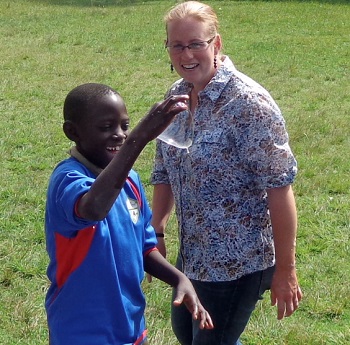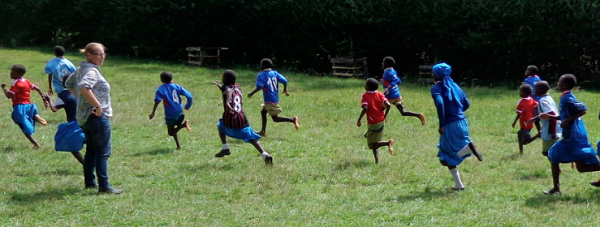Teaching in Kenya inspires graduate studies in Educational Foundations
Ask Harriet Johnston about her experiences living and teaching in Kenya, and she’s happy to tell you about her accomplishments, but she’s equally quick to add that she doesn’t want to take credit for all her hard work. Instead, she’ll tell you about all of the other teachers and community educators who were involved in the projects that she worked on and helped to launch. We hint that she’s returned from her two years abroad with a pronounced Canadian attitude, and she just laughs.
“It sounds like a lot,” she says, “but I really just helped put the pieces together.”
These pieces include a program that helps private school students to better understand the community outside their gated Kenyan school, while also helping girls and women in that community to attend school when they otherwise could not.  Today, Harriet (pictured at right with a student) is a graduate student in the Master of Arts in Education:Educational Foundations program at the Mount. Her studies focus on equality of education; she’s interested in the rights of students to access education, both here in Canada and globally. These studies have been inspired in part by her experiences teaching in Africa.
Today, Harriet (pictured at right with a student) is a graduate student in the Master of Arts in Education:Educational Foundations program at the Mount. Her studies focus on equality of education; she’s interested in the rights of students to access education, both here in Canada and globally. These studies have been inspired in part by her experiences teaching in Africa.
After she earned her Bachelor of Education degree, Harriet was exploring a work abroad website when she was offered a two-year teaching contract at a private school in rural Kenya.
“What surprised me the most was how much this school was a world of its own,” she reveals. The campus was on 300 acres in a rural area surrounded by a fence, and while the school employed over 200 members of the community who were vital staff members, overall the school was quite separate from the community outside.”
She admits that staying within these safe bounds would have been relatively easy, but when she noticed that her students didn’t really understand what life was like for rural Kenyans, she decided to find ways to bridge the school and the surrounding community.
Teachers at her school had founded the Turi Children’s Project, providing food, education and health information for young people in the community. Harriet extended this program, adding a Saturday component in which students from her school and children in the community share games, reading, activities, and meals.
Through the Turi Children’s project, Harriet met Sarah, a local social worker. Harriet was preparing to make an annual donation to the program, and Sarah quietly suggested sanitary pads for the young women. Without access to sanitary pads, these young women cannot leave their homes to work or attend school while they are menstruating. And not only are sanitary supplies prohibitively expensive, menstruation is a taboo topic in Kenya, meaning that it is very difficult for social workers like Sarah to ask donors for help providing these necessary supplies.
Harriet considered Sarah’s suggestion. However, she had recently met a woman who was providing hand-sewn, washable pads for girls and women in the slums near Nairobi. So she used her donation to buy a sewing machine. She and Sarah hired a local seamstress, and together, they got children from the community involved in designing and sewing the pads. The Turi Children’s Project committee enthusiastically helped and support spread.
Since Harriet and Sarah started this program, three more sewing machines have been purchased. In addition to making sanitary pads, they also repair local children’s school uniforms, helping them to access Kenya’s public education system. And community volunteers involved in the program develop employable skills by learning to sew and to bead.
And although Harriet is now at home in Nova Scotia, already planning to study access to education in a PhD program once she’s earned her Master’s degree, she admits she thinks often about returning to Kenya someday. “I can’t wait to go back—I couldn’t have left unless I knew I could go back. However,” she adds thoughtfully, “I don’t know where my education will take me.” 
Support the Turi Children’s Project »